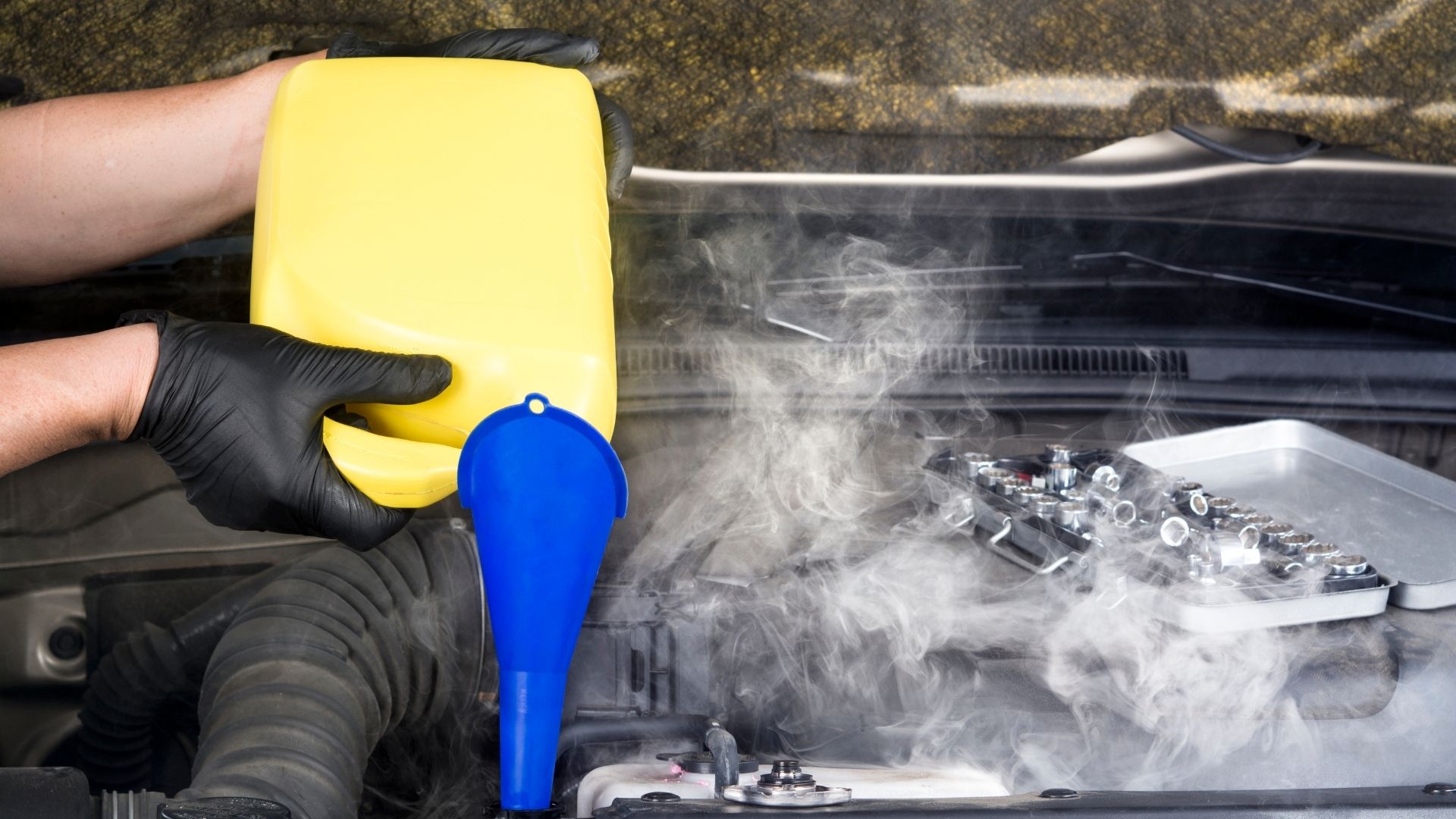Dealing with an overheated car that won’t start can be such a frustrating experience. Even though it may be challenging to identify the exact reason for this phenomenon, we’ve listed various causes and their solutions.
Car Overheated Now Won’t Start – Why?
Your car is overheated and won’t turn on is because of a blown head gasket, warped cylinder, bad piston valves, damaged thermostat, corroded battery, faulty sensors and seized engine
When your car overheats and it won start, you may encounter two types of situations, including:
- Your vehicle is overheated, it won’t start, but it is turning over
- Your car is overheated, there is no crank, and it won’t start
Regardless of your situation, you need to get the problem fixed by a licensed and certified technician. The following are some parts that may be affected by the heat, making it hard for your car to start:
Blown head gasket
As a result of intense heat, your car’s cylinder head and engine block could quickly expand and lead to a blown head gasket. When this happens, it forces coolant to leak into the combustion room.
Consequently, this will have the engine losing power, and eventually, no combustion will be initiated. So, your car won’t start.
Additionally, a blown head gasket will lead to more unexplained coolant loss that a pressure test can’t detect. This will cause your engine to overheat more. Bubble formations in the radiator and excessive white smoke coming out of the exhaust are some of the signs that you have a blown head gasket.
The ideal solution to this challenge is to replace the blown head gasket with a new one. Even though this may sound like a simple procedure, it’s not.
Replacing a blown head gasket is a complex task that requires reaching your car’s engine, taking it apart, taking out the blown head gasket, and replacing it with a new one. Therefore, this task is best left to a professional auto mechanic.
Warped cylinder head
If you have a blown head gasket, the chances are that you have a warped cylinder as well. Therefore, you should check the cylinder head for any damages if your car turns over but won’t start. Your car’s cylinder head should always be straight and even.
Sometimes when your car overheats, it will cause the cylinder head to expand to a certain degree. Once the engine cools down, the cylinder head may not reform back to the original shape. A damaged cylinder head can also sustain cracks.
The ideal way to solve this issue is to restore your warped and cracked cylinder head with a new one. However, if the cylinder head has warped slightly, you can always send it to your mechanic for flattening. But if the damage is too severe, you’re better off replacing it.
Bad piston valves/rings
Whenever your car overheats, it puts the piston rings and valves at risk. Since they’re responsible for sealing the engine cylinders, any damage can result in severe transmission issues.
Bad piston valves and rings will allow oil leakage. An oil-burning smell inside your car is a clear indication of this problem. You can use a compression test to determine whether your piston valves and rings are damaged.
Experts recommend replacing the bad piston valves and rings with new ones if you encounter this problem.
Like a head gasket, replacing faulty piston rings and valves is a complicated task best left to a professional mechanic. Both components are inexpensive, but replacing them may set you back around $2,000 depending on the make and model of your car.
Damaged thermostat
Your car’s dashboard is fitted with a dial that indicates the temperature of the entire system. When the thermostat measures the system’s temperature, it sends the signal to the ECU. However, if the sensor is damaged or not functioning correctly, the reading will be inaccurate.
An incorrect reading will affect the functioning of other components. If you notice that your engine is showing a higher than usual temperature, ensure that you check if it’s optimal or not. If your engine is optimal, you can fix the problem by replacing the damaged or malfunctioning thermostat.
A corroded or weak battery
An overheating engine can lead to a corroded or weak battery. Your car’s battery powers the ECU and other systems. When the battery is weak or dying, it will affect your car’s signal transmission and function. You need to inspect the battery and recharge or replace it if necessary.
It’s worth noting that driving around with a weak or dead battery increases the risk of your car shutting down in the middle of the road. This jeopardizes your safety and that of other road users.
Faulty sensors
Sensors are responsible for running the system’s components which in return power your car. Therefore, if the sensors are showing inaccurate readings, it will affect the functioning of these components. You should inspect the ECU and fuses to ensure that they work correctly.
If the sensors are faulty or damaged, you should replace them immediately. You can always use an OBD Code scanner tool to identify any defects in your car’s systems. This way, you can fix them in good time and avoid further problems.
A seized engine
If your car has overheated, there is no crank, and it won’t start, you may have a severe problem in your hands. Such an issue is usually connected to a seized engine. To verify whether you have a seized engine, use a ratchet or a ½” breaker bar to turn the crankshaft clockwise.
If the crankshaft doesn’t turn, you’re dealing with a seized engine. A seized engine can only be rebuilt and not fixed in most cases. It will cost you thousands of dollars for a professional mechanic to rebuild your engine.
You should also consider purchasing a used engine for your car. However, if the cost is too high, it may be best to sell the vehicle and buy another.
What Do You Do If Your Car Overheats and Won’t Start?
Sometimes it may be too late to notice that your car’s engine has overheated. If your car won’t start, open the hood and let the engine cool off.
Working on a hot engine is never a great idea, and it can easily burn your skin. Also, you shouldn’t pour cold water on your engine as it can damage it.
If the car has stopped in the middle of the road, turn on the hazard lights and place warning triangles around to alert other drivers. Contact towing services to get your car towed to a mechanic’s repair shop for fixing.
How Long Does It Take For Your Car to Cool Down After Overheating?
It takes approximately 30 minutes for an overheated engine to cool down and be safe to handle. If there is visible smoke coming from your car’s hood, you shouldn’t try lifting it. This steam is boiling water that can easily burn your skin.
Instead, monitor the temperature gauge to verify when the engine cools down. It takes up to two hours for your engine to cool down to the last few degrees. However, there are ways you can cool it faster and prevent further damage.
They include:
- Rev engine quickly
- Fan your car’s interior
- Start the engine and set the air conditioning to maximum
- Open the car windows
- Switch to recirculated air and close the windows
- Open the lower vents
- Switch off the engine but turn the key to the ‘on’ position
- Cool the radiator by spraying water on it
- Park your car in a shade
- Use a sunshade
Side Effects of Overheating
Once your car engine overheats, various side effects can occur if you continue driving the vehicle in that condition.
Cracked seals
Seals can only withstand the heat resulting from the normal engine function. When the car engine overheats, it will cause the seals to melt, dry out and even crack. With time, this will result in leaks.
Engine detonation
When your car engine overheats for long, it will cause the fuel to combust before reaching its maximum combustion state. Consequently, this will reduce the energy coming from gasoline, thus negatively affecting your car’s fuel economy.
Blown head gasket
If the engine overheats, it will exert pressure on the head gasket. After some time, this pressure will cause the metals to expand and lead to a cracked head gasket. This will result in a water leak inside the engine’s cylinders, and it can damage other components.
Warped cylinder heads
Cylinder heads are usually made from aluminum, a metal renowned for melting under excess heat. Therefore, if you continue driving an overheated car, it will result in warped cylinder heads.
How to Prevent Your Car From Overheating
There are various ways you can prevent your car from overheating even when the temperatures rise. They include:
- Ensure that you park your car in the shade
- Always check the coolant level and top it off if necessary
- Monitor your car’s temperature gauge at all times
- Have a professional auto mechanic perform regular coolant flushes
- Leave your car windows slightly opened
- Cool the engine by turning heat on
- Turn off the AC in sweltering conditions
- Consider replacing your car battery if it’s not providing the power it’s supposed to
- Have your car inspected regularly by a professional auto mechanic

